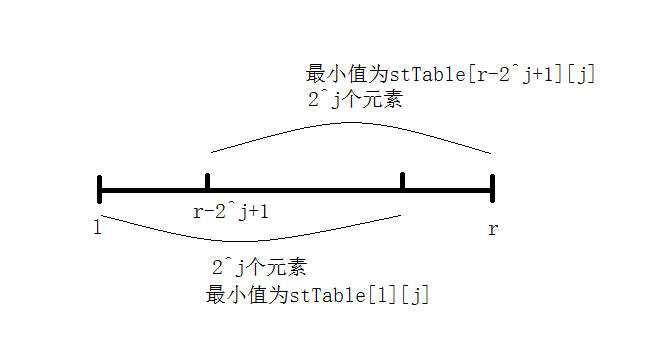POJ 3264 Balanced Lineup
来源:互联网 发布:mac版word怎么看字数 编辑:程序博客网 时间:2024/06/03 12:14
Balanced Lineup
Time Limit: 5000MS Memory Limit: 65536K
Total Submissions: 57016 Accepted: 26718
Case Time Limit: 2000MS
Description
For the daily milking, Farmer John’s N cows (1 ≤ N ≤ 50,000) always line up in the same order. One day Farmer John decides to organize a game of Ultimate Frisbee with some of the cows. To keep things simple, he will take a contiguous range of cows from the milking lineup to play the game. However, for all the cows to have fun they should not differ too much in height.
Farmer John has made a list of Q (1 ≤ Q ≤ 200,000) potential groups of cows and their heights (1 ≤ height ≤ 1,000,000). For each group, he wants your help to determine the difference in height between the shortest and the tallest cow in the group.
Input
Line 1: Two space-separated integers, N and Q.
Lines 2..N+1: Line i+1 contains a single integer that is the height of cow i
Lines N+2..N+Q+1: Two integers A and B (1 ≤ A ≤ B ≤ N), representing the range of cows from A to B inclusive.
Output
Lines 1..Q: Each line contains a single integer that is a response to a reply and indicates the difference in height between the tallest and shortest cow in the range.
Sample Input
6 3
1
7
3
4
2
5
1 5
4 6
2 2
Sample Output
6
3
0
Source
USACO 2007 January Silver
题意:
给一个序列,静态查询区间最大值和最小值的差。
思路:
这题是学st表(Sparse Table)的入门题。虽然区间查询可以用树状数组或者线段树,但是st表真好写真好写真好写啊……
接下来是st表的介绍……
对于一个序列,定义st[i][j]为从第i个元素开始
2j 个元素中的最大(小)值。
以最小值为例:st[i][j]=min(st[i][j-1],st[i+(1<<(j-1))][j-1])int stMin[maxn][50];void st_prepare(){ for(int i=n-1; i>=0; i--) { stMax[i][0]=stMin[i][0]=a[i]; for(int j=1; i+(1<<j)-1 < n; j++) { stMin[i][j]=min(stMin[i][j-1],stMin[i+(1<<(j-1))][j-1]); } }}访问区间 (l,r) 的最小值,令
k=[log2(len)] 。
最小值为min(stMin[l][k],stMin[r-(1<< k)+1][k])。
代码:
#include<cstdio>#include<iostream>#define maxn 100000using namespace std;int n,q;int a[maxn];int stMin[maxn][50];int stMax[maxn][50];void st_prepare(){ for(int i=n-1; i>=0; i--) { stMax[i][0]=stMin[i][0]=a[i]; for(int j=1; i+(1<<j)-1 < n; j++) { stMax[i][j]=max(stMax[i][j-1],stMax[i+(1<<(j-1))][j-1]); stMin[i][j]=min(stMin[i][j-1],stMin[i+(1<<(j-1))][j-1]); } }}/*int queryMax(int l,int r){ int k; int len=r-l+1; for(k=0;k<50;k++) { if((1<<k)<=len&&(1<<(k+1))>=len) break; } return max(stMax[l][k],stMax[r-(1<<k)+1][k]);}int queryMin(int l,int r){ int k; int len=r-l+1; for(k=0;k<50;k++) { if((1<<k)<=len&&(1<<(k+1))>=len) break; } return min(stMin[l][k],stMin[r-(1<<k)+1][k]);}*/int query(int l,int r){ int k; int len=r-l+1; for(k=0;k<50;k++) { if((1<<k)<=len&&(1<<(k+1))>=len) break; } return max(stMax[l][k],stMax[r-(1<<k)+1][k]) - min(stMin[l][k],stMin[r-(1<<k)+1][k]);}int main(){ while(~scanf("%d %d",&n,&q)) { int i,j; for(i=0;i<n;i++) scanf("%d",&a[i]); st_prepare(); while(q--) { int l,r; scanf("%d %d",&l,&r); printf("%d\n",query(l-1,r-1)); } }}- POJ 3264 Balanced Lineup
- POJ 3264 Balanced Lineup
- poj 3264 Balanced Lineup
- poj 3264 Balanced Lineup
- poj 3264 Balanced Lineup
- poj 3264 Balanced Lineup
- Poj 3264 Balanced Lineup
- poj 3264 Balanced Lineup
- POJ-3264-Balanced Lineup
- poj 3264 Balanced Lineup
- poj 3264 Balanced Lineup
- POJ 3264-Balanced Lineup
- poj 3264 Balanced Lineup
- POJ 3264 Balanced Lineup
- POJ-3264-Balanced Lineup
- POJ 3264 Balanced Lineup
- POJ 3264 Balanced Lineup
- poj 3264 Balanced Lineup
- OpenCV-利用CV_MAT_ELEM宏和CV_MAT_ELEM_PTR宏存取CVMat数组元素
- 欢迎使用CSDN-markdown编辑器
- 手把手教你在Windows10下安装Tensorflow1.2
- 程力集团网址大全
- leetcode--18. 4Sum
- POJ 3264 Balanced Lineup
- ros如何及时清除障碍物层或者超声波层的的消息 clear_costmap_recovery 代码详解
- httpclient与springmvc整合
- 嵌入式应用之-初始化部分
- servlet之文件的上传下载(一)
- 用PopupWindow实现下拉列表,并再次熟悉一些其他基础知识点。
- 最小公倍数和最大公约数
- 螺旋矩阵 II -LintCode
- QString::arg()//用字符串变量参数依次替代字符串中最小数值



